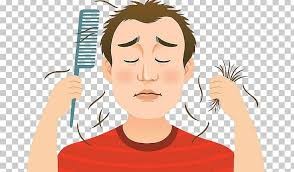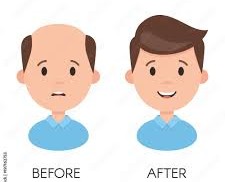Hair Regrowth – Understanding the Problem and Finding Real Solutions


What Causes Hair Loss?
Hair loss is one of the most common problems faced by both men and women. The question many people ask is: why does it happen? The answer is that there are many reasons behind it, and often more than one factor plays a role.
- Family history of hair thinning
- Hormonal changes that affect hair growth
- Stress, poor sleep, and unhealthy lifestyle
- Certain medications that may slow down hair growth
When the body goes through these changes, hair roots become weaker and stop producing new healthy hair. This is why people notice thinning or bald patches. This shows that hair loss is not a simple condition but one that often needs both lifestyle changes and treatment.
Can Everyday Habits Make Hair Loss Worse?
The way we live has a big impact on the strength of our hair. Even small habits can either help or harm hair growth.
- Eating fast food often and missing key nutrients
- Smoking and alcohol use affecting blood flow to the scalp
- High stress levels increasing hair shedding
- Using too much heat styling or harsh hair products
If these habits continue for a long time, the scalp cannot support strong hair regrowth. This is why experts often suggest making small lifestyle changes as the first step in solving hair loss. Healthy daily routines can slow down the problem and help other treatments work better.
How Important Is Nutrition for Hair Growth?
Food is fuel for every part of the body, and hair is no different. Poor nutrition often shows up in weak, brittle, or thinning hair.
- Protein helps build strong hair strands
- Iron supports blood flow to hair roots
- Zinc helps repair damaged follicles
- Vitamins such as Vitamin D and Vitamin E keep hair healthier
By eating more balanced meals with fresh fruits, vegetables, lean meats, and whole grains, people can support hair regrowth naturally. Good nutrition is not always enough on its own, but it creates the foundation for healthy hair.
Is Stress Really Linked to Hair Loss?
Many people wonder if stress can really cause hair to fall out. The answer is yes. Stress can interrupt the natural cycle of hair growth, pushing more hairs into a resting phase and causing shedding.
- Emotional stress from personal or work problems
- Physical stress from illness or surgery
- Lack of proper rest and sleep
- Anxiety and constant worry
When stress levels stay high, hair loss often becomes worse. Finding ways to relax, such as meditation, exercise, or spending time in nature, can support hair regrowth. This makes stress management an important part of solving the problem.
Do Natural Remedies Work for Hair Regrowth?
Many people try oils, massages, or herbal solutions for their hair. These methods may provide comfort, but they do not always bring lasting results.
- Coconut oil or castor oil may reduce dryness
- Scalp massage can improve circulation
- Herbal teas and supplements may give vitamins
While natural remedies can support overall scalp health, most experts agree that they are not strong enough to fully stop or reverse hair loss on their own. Natural care can help but usually needs to be combined with proven treatments.
What Medical Options Are Available?
When lifestyle changes and natural methods are not enough, people often look at medical solutions. Doctors can guide patients toward effective treatments that have been studied and tested.
- Topical solutions applied directly to the scalp
- Oral medications that work inside the body
- Professional treatments at clinics
One of the most common medicines prescribed for male pattern hair loss is Finasteride, also known by the name Healpecia. It works by reducing the effect of hormones that weaken hair follicles. This makes medical treatment an important choice for people looking for stronger and more reliable results.
How Does Finasteride (Healpecia) Help in Hair Regrowth?
Finasteride (Healpecia) is designed to help men with thinning hair caused by hormonal changes. It works by blocking the hormone responsible for shrinking hair follicles.
- Helps slow down hair loss in men
- Supports regrowth of stronger, thicker hair
- Best results seen when taken regularly
- Works well when combined with healthy lifestyle changes
Doctors often recommend Finasteride (Healpecia) for men experiencing early or moderate hair loss. Women should not use this medicine, and it should always be taken only under medical guidance. This makes Finasteride (Healpecia) a trusted option in the fight against hair loss.
Final Thoughts on Hair Regrowth
Hair loss can be stressful and emotional, but solutions do exist. From lifestyle changes to proven treatments, people have options to protect and regrow their hair. By focusing on nutrition, stress control, and medical guidance, hair can often be restored to a healthier state. Finasteride (Healpecia) has shown strong results for many men, making it a key part of medical care for hair regrowth. Taking action early and seeking the right support gives the best chance for long-term success in managing hair loss.
Drug Description Sources: U.S. National Library of Medicine, Drugs.com, WebMD, Mayo Clinic, RxList.
Reviewed and Referenced By:
- Dr. Alan Carter, PharmD
Clinical pharmacist specializing in men’s health and hormonal therapy. Frequently cited on Drugs.com and RxList for reviewing therapeutic guidance on Finasteride (Healpecia).
- Dr. Sarah Mitchell, MD
Dermatologist focusing on hair and scalp disorders. Provides expert input for WebMD and Mayo Clinic on hair regrowth treatments and safe use of medicines.
- Dr. Robert Lane, MD
Internal medicine specialist with experience in chronic conditions and medication use. Referenced in U.S. National Library of Medicine and RxList for clinical guidance on Finasteride and related therapies.
- Dr. Emily Parker, PharmD
Expert in patient education and treatment guidance for hair loss medications. Contributed reviews for Drugs.com and WebMD regarding safety profiles and patient use instructions.
(Updated at Sep 23 / 2025)

